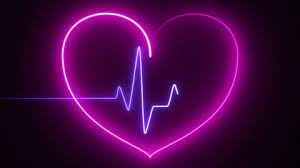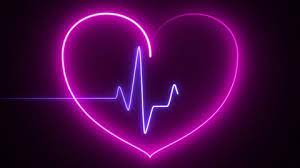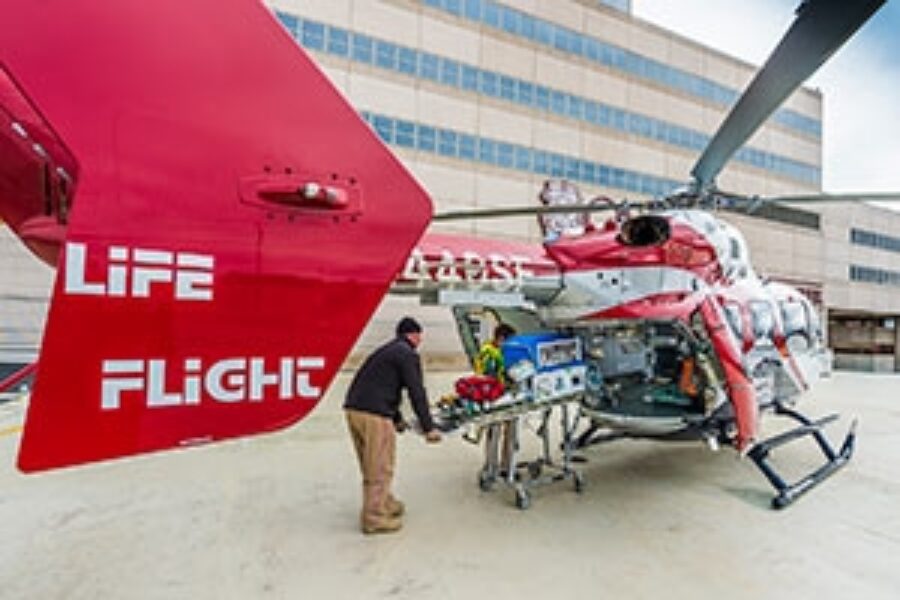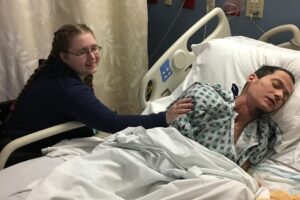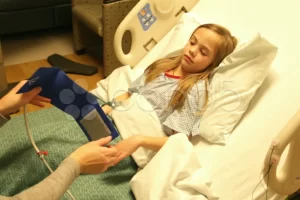A Fictional Ambulance Report and Medical PTSD
I was in and out the whole ride to the hospital. Vaguely, I remember the EMT in back with me placing an oxygen mask over my face and calling in report. Some parts of the report stuck with me, like when he said I was” alert and oriented”. I could barely catch their words because I couldn’t stay conscious the whole ride down there. Another part I caught was when he said my heart rate which was around 165 was my baseline. He claimed that my oxygen levels were 95% on room air, but I was on 3 L of oxygen. Then he ended the report by stating that I was well-known to their facility. My medical PTSD began revving up at this point. If I had the energy and brain capacity to speak, I would have called him out on his report.
Instead, I continued zoning in and out. Before they pulled me out at the hospital, they tucked my pink unicorn comforter (which Jeff had made sure went with me) around me to keep me warm from the cool October chill. I clutched at my bear Griffin who Jeff had also made sure went along with me.

Entering the ER and Instant Medical PTSD
Then they rolled me into the hospital where the fluorescent lights were on so bright you could never tell if it was day or night. The squawking monitors were a constant background noise that you just had to learn to tune out or it would drive you, in Jeff’s words, “absolutely batshit crazy.”
For me, it triggered my medical PTSD due to all the pain of my disease, the pain and discomfort and nausea and other side effects from all my treatments, and worst of all from doctors who don’t believe you when you tell them a million times that you don’t have an eating disorder, there is something physically wrong and that something is wrong with you.
Hospitals reminded me of multiple NJ tube placements, frequent surgeries, a life flight to Mass General Hospital at 2 AM where I came within seconds of bleeding out, doctors still telling me it’s all in my head, being treated like a drug seeker just because I’m young. Now my medical PTSD was showing me slides in my head of all the trauma from being sick, and all the trauma from people thinking I’m not really sick.

Pooping the Bed
When the EMTs transferred me from their stretcher to the hospital’s ER gurney, they tried to take my own soaker pad out from under me so that it wouldn’t get lost with the hospital’s bedding.
For a few seconds, I was mortified when I realized that during my seizure I had pooped all over the soaker pad. That meant I had pooped all over my pants and underwear as well.
Jeff and I had separate beds because I require a hospital bed, but we had taken down the side rail off on the right side and pushed the beds together. Despite the fact that he had a huge memory foam gel Queen Size bed, he still slept in my bed often. I just prayed that I hadn’t pooped all over Jeff’s side of the bed.
An EMT That Didn’t Trigger Medical PTSD
Then I realized I was being silly. Jeff wouldn’t care. Jeff loved me unconditionally, chronic illness and all, and I loved him unconditionally, chronic illness and all. I never got mad at him when his Lactulose made him have an accident in bed. There would be absolutely zero reasons for him to get mad at me for having an accident in bed. I probably had just contained the accident to the soaker pad, my pants, and underwear anyway.
“The nurse or aide will help clean you up,” The older EMT with the balding head and the gray goatee saw me looking at the poop on the soaker pad. “In the meantime, we’ll put this in a patient belongings bag so that your boyfriend or one of your caregivers can wash it for you.”
At least this EMT was one of the few local health professionals in the area who didn’t further perpetrate my medical PTSD.

It’s Just a Crappy Situation (Literally)
He took the pad in his gloved hands and rolled it up so that the poopy side was facing in. Then he grabbed a white plastic bag out of the closet to put it in.
“Most people who have seizures have accidents,” he assured me. “It makes perfect sense that this happened.”
Now my foggy muddled, postictal brain was beginning to remember that this had happened during previous seizures, but it didn’t make a difference. It embarrassed me every time. At 26 years old I shouldn’t be having accidents, chronic illness or not. Those were my thoughts about it anyway. I’m still having accidents today at 30, only now they’re even worse. By now I’ve learned to accept them. They’re just part of being chronically alive.
Getting Registered, Triaged, and Tested
After the EMTs left someone came in to register me. They asked me the usual questions about my address, phone number, email address, religion, next of kin, and health care proxy. Then she wanted to know who I wanted to be notified in an emergency and if I wanted my name listed on the patient registry.
At that point, I was still so postictal that I don’t even remember how I answered or what I said. Somehow the end result was I told her I gave verbal consent and she snapped a hospital bracelet around my wrist.
By the time the nurse came in to do her triage assessment, I was out cold.
I woke up briefly to a nurse’s aide wiping my bottom and putting a diaper she must have grabbed from the pediatric floor on me.

The next time I woke up, a nurse was standing over me drawing blood from my port.
“You are one sleepy girl,” she told me.
“I always get tired after seizures,” I told her.
“Well, we’re drawing a prolactin level which should tell us if this was a seizure or something else like a psychogenic seizure. We also are going to do an EEG next.” She explained.
Getting More Medical PTSD Triggered
I bristled at the fact that she would even question whether I’d had a real seizure. Ghost feelings from the past were rising up as she speculated on whether it was possibly a “psychogenic” seizure. Why was it that people loved to blame things on psychological causes? More medical PTSD symptoms came rising to the top of my consciousness, even though this was nothing new. Probably because this was nothing new. Just because someone has a mental illness in their history doesn’t somehow immunize them from physical illness, but other people with mental illness and medical illnesses get treated for both, so why not me?
“You’re Too Young to Have All of These Problems”
Actually, I knew why. It was because I looked so young. If you looked past the wheelchair and all the tubes coming out of me, I looked healthy. I was always smiling so it was hard to fathom that someone like me was living with the end stages of such a severe disease.

I couldn’t change any of that. All I wanted was for people to be able to hold the dialectic in their hands that yes, I was young. Yes, I looked healthy. Yes, I thought positively. But I was going through chronic illness hell that only had one end to it. That end was creeping closer and closer. It would be joining my maternal grandfather, my best friend and old piano teacher, and my Uncle David in heaven, but at least when I finally passed the doctors would stop telling me I was too young to have all these problems, at least it would put an end to the medical PTSD once and for all.
Once the nurse drew the blood I was starting to wake up.
Getting an EEG to Check for Seizure Activity
A transport tech came to take me to a room where there was a space for a stretcher and a whole bunch of leads and glue.
My first thought was, “how am I going to get all of these leads and glue out of my waist-length dark blonde hair when I finish the test?”
Melody was going to have a job cut out for her.
The man doing the test was very kind and not at all perturbed by the fact that I kept nodding off. He glued lead after lead into my beautiful carefully shampooed, conditioned, brushed, and french braided hair. Now it was just a wild mess.

“All right,” he told me when he finally finished gluing the last leads in. “Now you just lie here for an hour. For the first half-hour, you just lie here and rest and the EEG will just record your brain waves, then I’ll introduce some stimuli and we’ll see how your brain reacts to that.”
Intrusive Medical PTSD Thoughts and Flashbacks
I lay down through the entire hour-long test. Thoughts of frustration ran through my head over the way that nurse had suggested that my seizure was psychogenic. It was sickening how often my chronic illnesses had been dismissed as psych issues. I tried to take my mind off the dumb nurse’s comment, but all I could do was lay there and not move so that the guy could watch my racing brain waves on an EEG. Don’t let anyone tell you that medical PTSD is not a real thing.
At the end of the test, the guy pulled all of the leads out of my hair. I was left with the worst bad hair day of the century. This was driving me nuts because it was the only part of my body that I liked. It was the only part of my body that I could control, and right now my medical PTSD was making me feel like there was nothing in my life that I could control, it felt like I was at the complete mercy of all the doctors and healthcare professionals.
Finally Meeting With the Doctor
By the time the doctor came in to meet with me, I had been at the ER for five hours and was wide awake.

“You had a grand mal seizure,” he told me.
I almost laughed. Without going through an additional 8 years of school I could have told him that five hours ago.
“Your prolactin levels are extremely high, and your EEG is still showing a lot of residual seizure activity. These two tests tell me that what you had was a very intense grand mal seizure. How are you feeling now?” he asked me.
“I still feel a little postictal, but I’m coming out of it,” I told him.
“That’s good,” he said, “I’d like to at least admit you overnight. That way the neuro folks can take a look at you in the morning and figure out why you had the seizure and if we need to adjust your Keppra dose or anything like that. This was a really major seizure. Had your boyfriend not reacted the way he did, you could have sustained massive brain trauma from hitting your head on the side rail of your bed. If you didn’t acquire brain trauma from that you would have from falling to the floor or from having such a prolonged seizure. You tell that boyfriend of yours that he saved your life.”
Jeff and Two Packages of Lifesavers
Jeff came to visit me the next morning at the hospital. As usual, he waited until no one was around and then climbed into bed with me. I gave him a big hug. As soon as he arrived, all symptoms of Medical PTSD evaporated. Jeff’s presence made me feel safe, reassured, and understood.

“The doctor in the ER says to tell you that you saved my life, so I owe you one,” I told him.
“I’ll take a spearmint Lifesaver then,” Jeff told me.
I laughed and leaned over and kissed him on the lips. He leaned into the kiss and wrapped his arm around me pulling me in for a hug,
“I would even settle for a peppermint Lifesaver,” he whispered into my ear.
“I’ll get you a whole package of each,” I whispered back.
Then I rested my head on his shoulder. I might be missing trick or treating, but as I lay there with Jeff, it didn’t matter what chronic illness had stolen from us. The medical PTSD that had been so consuming had shrunk to the size of a tick. We just lay there happy to be together and ready to face anything the world was going to throw at us.
Discover more from chronicallyalive.org
Subscribe to get the latest posts sent to your email.
